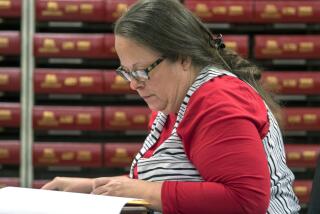Florist who rejected same-sex wedding job broke Washington law, judge rules
- Share via
A Washington state florist who refused to provide flowers for a same-sex wedding, citing religious reasons, violated consumer protection laws, a judge ruled Wednesday.
The lawsuit, filed in 2013 by Washington Atty. Gen. Bob Ferguson, centered on Arlene’s Flowers, a shop in eastern Washington that refused to provide flowers for a same-sex wedding, with the owner telling a longtime customer that it was “because of my relationship with Jesus Christ.”
The attorney general argued that the business had violated state consumer protection laws, which prohibit discrimination based on sexual orientation. Same-sex marriage has been legal in Washington since 2012.
In a 60-page opinion, Benton County Superior Court Judge Alexander C. Ekstrom said Barronelle Stutzman’s actions became illegal the day voters passed a referendum legalizing gay marriage.
Stutzman had argued that the tenets of her “Southern Baptist tradition” precluded her from arranging flowers for same-sex weddings, or to allow any of her employees to do so.
“Religious motivation does not excuse compliance with the law,” the judge wrote.
“Stutzman is not a minister, nor is Arlene’s Flowers a religious organization when they sell flowers to the general public,” Ekstrom wrote. “Stutzman cannot comply with both the law and her faith if she continues to provide flowers for weddings as part of her duly licensed business.”
An attorney for Stutzman criticized the ruling, calling it a blow to free expression.
“The ruling basically said that if you dare to not celebrate same-sex marriage because it violates your religious convictions, that the government has a right to bring about your personal and professional ruin,” Kristen Waggoner, an attorney with Alliance Defending Freedom, told The Times. “Her home, her business ... her life savings and retirement, these are all in jeopardy ... all because of her deeply held religious views.”
According to court documents, weddings made up about 3% of Stutzman’s total business at Arlene’s Flowers in the five years leading up to the lawsuit.
Waggoner said her client planned to appeal and would continue to decline providing wedding services altogether, which the business has done since the case was filed.
After the decision, Ferguson said he was proud of his agency’s work pursuing the case.
“We are a nation of laws, and you have to follow those laws,” the attorney general said in an interview. “If an African American walked into a restaurant, no one would question whether a restaurant must serve them.”
Robert Ingersoll and his husband, Curt Freed, said they had spent thousands of dollars and had been buying flowers from Arlene’s for nearly a decade when Ingersoll asked Stutzman to provide flowers for their wedding in 2013.
Stutzman declined, writing in a Facebook post later that it was because of “my relationship with Jesus Christ.”
“I believe, biblically, that marriage is between a man and a woman,” Stutzman wrote. “That is my conviction, yours may be different.”
Stutzman said Ingersoll gave her a hug, said he “respected my opinion,” and left.
The couple, who have since married, later sued, claiming $7.91 in out-of-pocket expenses, or the cost of driving to find a new florist.
Stutzman argued, in part, that her floral arrangements were artistic expression and were protected speech under the 1st Amendment, and that she could not be compelled to “speak” through her floral arrangements for a same-sex wedding.
The florist also argued that the attorney general brought the case because he “saw an opportunity to make an example out of Stutzman and Arlene’s Flowers.”
The judge rejected those arguments Wednesday.
In a statement released in December by the ACLU, which represented the couple, Freed and Ingersoll said they were “hurt and saddened” when Stutzman denied them service. “We respect everyone’s beliefs, but businesses that are open to the public have an obligation to serve everyone,” the couple said.
“Religious freedom is a fundamental part of America,” Sarah Dunne, legal director of ACLU Washington, said in a statement. “But religious beliefs do not give any of us a right to ignore the law or to harm others because of who they are.”
The lawsuit originally sought $2,000 in fines for each violation of the law.
Those fines and any other economic damages are expected to be determined at a later date.
For breaking news, follow @cmaiduc on Twitter.
More to Read
Sign up for Essential California
The most important California stories and recommendations in your inbox every morning.
You may occasionally receive promotional content from the Los Angeles Times.











